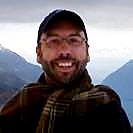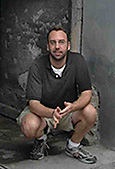Talking to Michael Meyer (China 1995-97)
Michael Meyer received a Whiting Writers’ Award for nonfiction after publishing his first book, The Last Days of Old Beijing: Life in the Vanishing Backstreets of a City Transformed. He has also held a Guggenheim Fellowship. His stories have appeared in Time, The New York Times, Smithsonian, Sports Illustrated, Slate, the Financial Times, the Los Angeles Times, the Chicago Tribune, and on “This American Life.”
In Manchuria: A Village Called Wasteland and the Transformation of Rural China has just been published by Bloomsbury Press. Today, Michael teaches nonfiction writing at the University of Pittsburgh and spends his free semesters in Singapore.
 I recently interviewed Mike about his career, China, and his books.
I recently interviewed Mike about his career, China, and his books.
•
Mike, where did you serve as a PCV and when?
Peace Corps China 2; 1995-1997.
.
 Q. Now you stayed on in China . . . was this so you could write Last Days?
Q. Now you stayed on in China . . . was this so you could write Last Days?
No, post-Corps, I moved to Beijing in 1997 to teach English, after which I stayed on as a writer. I didn’t begin the Beijing book until 2005, after returning to the US for graduate school at Berkeley, then a year learning to read Chinese at Tsinghua University in Beijing.
.
Given that book, why did you decide to writer In Manchuria?
 I think it’s time to write a book when the book you want to write doesn’t exist. I had written a book about changes in urban China, but wanted to read one about changes to rural China, where the majority of the population still lives. So I moved 600 miles northeast from Beijing to the village where my wife grew up, a little rice-farming town named Wasteland. I thought I’d spend time collecting lore and traveling the region, and a book would result from that. Little did I expect that Wasteland would be at the forefront of changes in Chinese agriculture, as it transitioned from family-farmed plots to a large farm managed by an agribusiness. Now Wasteland is becoming a company town.
I think it’s time to write a book when the book you want to write doesn’t exist. I had written a book about changes in urban China, but wanted to read one about changes to rural China, where the majority of the population still lives. So I moved 600 miles northeast from Beijing to the village where my wife grew up, a little rice-farming town named Wasteland. I thought I’d spend time collecting lore and traveling the region, and a book would result from that. Little did I expect that Wasteland would be at the forefront of changes in Chinese agriculture, as it transitioned from family-farmed plots to a large farm managed by an agribusiness. Now Wasteland is becoming a company town.
v
Why did you join the Peace Corps? I know you spoke Spanish and wanted to go to Latin America, and, of course, the Peace Corps, in their infinite wisdom, sent you to China, but why didn’t you turn down that assignment and seek another in LA?
I was always interested in Peace Corps, and I was an education major at the University of Wisconsin-Madison, which historically has churned out Volunteers. I had spent time with United Farm Workers on the Texas/Mexico border, and that led to my applying to the program, thinking I’d be sent to do similar work in Latin America. I was offered seven placement countries — none of which spoke Spanish. Russia, Mongolia, Turkmenistan, Kiribati . . . I kept saying, “No,” until the recruiter finally snapped, “It’s not Club Med, it’s the Peace Corps. You don’t get to choose.” I thanked him for his time. A few days later, he called back and said, “Last offer, take it or leave it: China.” I was airborne in three weeks.
v
I was in Beijing in the fall of 1980 when China was just opening up for tourists. I was on a travel assignment for Diversion Magazine and stayed in a hotel within blocks of Tiananmen Square. I wrote a piece about the “underground city” — the network of tunnels and rooms that stretched, I was told, as far away as the airport. This “city” was built by the Chinese people after the split up with Russia, and the construction was done by the people themselves. I entered the “city” through a small door behind a counter in a department store that was close to the hotel. I am sure the store is gone now, as is the hotel, but did you ever hear or see this city, which when I was there was being used for storage as well as rooms for visiting relatives from the provinces?
I visited this city briefly in The Last Days of Old Beijing, since there was an entrance to it under my bed in the courtyard where I lived. A small portion of the tunnels network is still open for tourists. The entrance under my bed is not.
v
Your friend, writer Peter Hessler (China 1996-98), says that every time he returns to China it is a different country. What are you impressions? The same?
It’s a two-way street: We’re different when we return to China, too.
v
With your long years and experiences in China what impresses you most about the people?
Their sense of humor. Chinese are just as self-effacing and quick to laugh as Americans.
v
As I understand, you spend summers in Singapore. Are you working on a new book?
I’m “auditioning” for a new book. Singapore and I are checking each other out.
v
I’m interested, as I am sure other RPCV writers would be, in your writing career since being a PCV. Give us a tracking of your awards and schooling and places where you have lived and worked.
Post-Peace Corps I went to graduate school at UC-Berkeley, where I majored in Education and took a slew of writing classes in fiction and journalism. I moved back to China to write, and researched The Last Days of Old Beijing. That book resulted in a Whiting Writer’s Award, a Guggenheim Fellowship, and a job offer as an Assistant Professor of English at the University of Pittsburgh, where I teach nonfiction writing.
v
Right now, if you had to pick one place to live…..where would it be, and why?
Within walking distance of Yosemite National Park, so my toddler son and I could hike every day. I took him last year, when he was two, and he waded right into the Merced River and started looking for stones to skip across the surface.
v
Finally, what next for Mike Meyer?
Full-time parenting for a while, I hope. Followed by another book. Though, if I were 23 again, I’d be applying for Peace Corps Burma!
